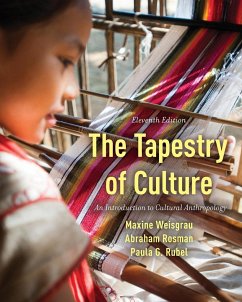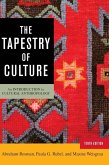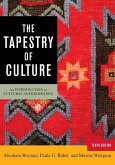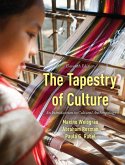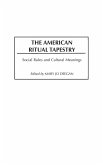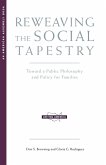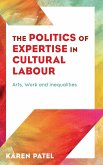Maxine Weisgrau, Abraham Rosman, Paula G. Rubel
The Tapestry of Culture
An Introduction to Cultural Anthropology
Maxine Weisgrau, Abraham Rosman, Paula G. Rubel
The Tapestry of Culture
An Introduction to Cultural Anthropology
- Broschiertes Buch
- Merkliste
- Auf die Merkliste
- Bewerten Bewerten
- Teilen
- Produkt teilen
- Produkterinnerung
- Produkterinnerung
The celebrated introduction to anthropology fully revised for today's globalized world
Andere Kunden interessierten sich auch für
![The Tapestry of Culture The Tapestry of Culture]() Abraham RosmanThe Tapestry of Culture203,99 €
Abraham RosmanThe Tapestry of Culture203,99 €![The Tapestry of Culture The Tapestry of Culture]() Abraham RosmanThe Tapestry of Culture104,99 €
Abraham RosmanThe Tapestry of Culture104,99 €![The Tapestry of Culture The Tapestry of Culture]() Maxine WeisgrauThe Tapestry of Culture188,99 €
Maxine WeisgrauThe Tapestry of Culture188,99 €![The American Ritual Tapestry The American Ritual Tapestry]() Mary Jo DeeganThe American Ritual Tapestry76,99 €
Mary Jo DeeganThe American Ritual Tapestry76,99 €![The Archaeological Authority of the Bayeux Tapestry The Archaeological Authority of the Bayeux Tapestry]() Michael John LewisThe Archaeological Authority of the Bayeux Tapestry164,99 €
Michael John LewisThe Archaeological Authority of the Bayeux Tapestry164,99 €![Reweaving the Social Tapestry Reweaving the Social Tapestry]() Don S. And BrowningReweaving the Social Tapestry16,99 €
Don S. And BrowningReweaving the Social Tapestry16,99 €![The Politics of Expertise in Cultural Labour The Politics of Expertise in Cultural Labour]() Karen PatelThe Politics of Expertise in Cultural Labour168,99 €
Karen PatelThe Politics of Expertise in Cultural Labour168,99 €-
-
-
The celebrated introduction to anthropology fully revised for today's globalized world
Hinweis: Dieser Artikel kann nur an eine deutsche Lieferadresse ausgeliefert werden.
Hinweis: Dieser Artikel kann nur an eine deutsche Lieferadresse ausgeliefert werden.
Produktdetails
- Produktdetails
- Verlag: Rowman & Littlefield Publishers
- Eleventh Edition
- Seitenzahl: 438
- Erscheinungstermin: 18. Juli 2023
- Englisch
- Abmessung: 254mm x 203mm x 23mm
- Gewicht: 933g
- ISBN-13: 9781538163818
- ISBN-10: 1538163810
- Artikelnr.: 67215764
- Herstellerkennzeichnung
- Libri GmbH
- Europaallee 1
- 36244 Bad Hersfeld
- gpsr@libri.de
- Verlag: Rowman & Littlefield Publishers
- Eleventh Edition
- Seitenzahl: 438
- Erscheinungstermin: 18. Juli 2023
- Englisch
- Abmessung: 254mm x 203mm x 23mm
- Gewicht: 933g
- ISBN-13: 9781538163818
- ISBN-10: 1538163810
- Artikelnr.: 67215764
- Herstellerkennzeichnung
- Libri GmbH
- Europaallee 1
- 36244 Bad Hersfeld
- gpsr@libri.de
By Maxine Weisgrau; Abraham Rosman and Paula G. Rubel
Detailed Contents
Preface
Acknowledgments
About the Authors
1 Anthropological Perspectives
Learning Objectives
Studying Culture: Assumptions and Debates
Human Evolution and Culture: The Emergence of Anatomically Modern Humans
Upright Walking and Bipedalism: Cultural Implications of Evolutionary
Change
Meat Eating: Raw and Cooked
Cultural Universals: What characteristics do all humans share?
Cultural Rules and Norms
Society
Social Structure
Analyzing and Writing about Culture: A Brief History of Anthropological
Approaches
Cultural Evolutionary Theory
Franz Boas and Cultural Relativism
Functionalism
Structuralism
Symbolic Anthropology
Focus on History in Anthropology
Feminist Anthropology: "Male" and "Female" in Theory and Practice
Postmodernism in Anthropology
Fieldwork and Ethnography in the 21st Century
Globalization as an Anthropological Issue
The Anthropocene
The Material World and Culture: Environmental Anthropologies
Political Ecology: Ecosystems and Inequalities
The fieldwork journey
Summary
Key Terms
Suggested Readings
Suggested Websites
2 Anthropological Methods
Learning Objectives
Fieldwork
Anthropology Moves to the Study of Complex Societies
Studying Rituals Across Time and Space: The Comparative Approach
American White Wedding Gowns and Rituals
White Wedding Gowns and Rituals: A Brief History
Wedding Ritual Variation: Marriage Equality and an American Wedding
The Comparative Approach
Summary
Key Terms
Suggested Readings
Suggested Websites
3Language and Culture
Learning Objectives
The Evolution of Spoken Language Capacity
The Structure of Language
Phoemic Structure
Morphemic Structure
Syntax and Grammar
Linguistic Relativity
Linguistic Universals
Language, Cognition, and Understanding
Ethnosemantics
Sociolinguistics
Gender and Speech
African-American Vernacular English
Language Change and Historical Linguistics
Contact Languages: Pidgins and Creoles
Language Imperialism
Language Loss and Revitalization
Language, Power, and Policy
World Englishes and the Spread of English
Summary
Key Terms
Suggested Readings
Suggested Websites
4 Learning Who We Are: Culture and The Individual
Learning Objectives
Parenting and Alloparenting
Fathers as Caregivers
Migrating Parents and Global Labor Markets
What is Human Nature? Nature, Nurture and Beyond the Dichotomy
How Children Learn to Communicate
Learning Cultural Norms
Nonverbal Communications
Learning Gender Roles
Culture and Personality
Social Status and Personality
Rebels and Innovators
Emotional Expression and Cultural Norms
Culture and Mental Illness
Cross-Cultural Study of Mental Illness and Wellness: 21st Century
Challenges
Summary
Key Terms
Suggested Readings
Suggested Websites
5 Symbols and Their Meanings
Learning Objectives
Categories of Symbols
The Symbolism of Food
Social Groups, Social Categories, and Their Symbols
Symbolic Meanings of Space
Body Symbolism
Symbolism of Body Decoration
The Symbolism of Sports
Universal Symbols
Symbols, Politics, and Authority
Public Memorials and Monuments: Creating and Contesting Symbols of History
Summary
Key Terms
Suggested Readings
Suggested Websites
6 Ties That Connect: Marriage, Family, and Kinship
Learning Objectives
Marriage
Marriage Prohibitions
Exogamy and Endogamy
Sister Exchanges
Marriage Payments
Bride Service
Number of Spouses
Levirate and Sororate
Dissolution of Marriage
Postmarital Residence
Descent Systems
Patrilineal Descent and Matrilineal Descent
Unilineal Descent Groups: Their Structures and Function
Clans
Lineages
Moieties
Kindreds
Relations Between Groups through Marriage
Kinship Terminology Systems
Fictive Kinship
Kinship in the Contemporary World
The Transnational Family
Kinship in America Today
Varieties of American Families
Kinship, Class, and Ethnicity
Marriage, Migration, and State Policy
Summary
Key Terms
Suggested Readings
Suggested Websites
7 Gender, Sexualities, and Age
Learning Objectives
Theorizing Gender and Sexuality
Sexuality and Identities
Identities and Political Participation
Reproduction and Culture
Work and Gender
Gender and the Care Economy
Gender and Industrialization
Categories Based on Age
Age Grades and Age Sets
Aging, Retirement, and Care
Summary
Key Terms
Suggested Readings
Suggested Websites
8 Economic Organization: Production, Distribution, and Consumption
Learning Objectives
Production
Hunting and Gathering
Contemporary Hunters and Gatherers
The Introduction of Agriculture
Horticulture
Grain Production
Agriculture in Today's World
Animal Domestication and Pastoralism
Nomadic Pastoralism in Today's World
The Organization of Work
The Organization of Work in Contemporary Societies
Distribution
Distribution in Egalitarian Societies
Systems of Exchange in Societies with Flexible Rank
Systems of Exchange with Fixed Rank
Caste in India
Barter
The Market System
The Market Economy and Globalization
Consumption
The Changing Nature of Consumption
Summary
Key Terms
Suggested Readings
Suggested Websites
9 Power, Politics, and Conflict
Learning Objectives
Concepts in Political Anthropology
Forms of Political Organization
Informal Leadership
Band Organization
Big Man Structure
Chieftainship
The State
War and Peace
The Anthropology of Violence
Law and Social Control
Law in Postcolonial States
Nation Building in Postcolonial States
Empowerment
Politics in Contemporary States
Factionalism
Warlords
Patron-Client Relationship
Political Economy
Political Resistance and Globalization
Summary
Key Terms
Suggested Readings
Suggested Websites
10 Belief Systems, Rituals, and the Spirit World
Learning Objectives
Religion Studied/ Religion Defined?
Ritual: Approaching the Supernatural
Rites of Passage
Rites of Passage in American Culture
Rites of Intensification: Practice and Politics
Stories about the Supernatural World
Analyzing Myths: Historical and Contemporary Views
American Myths, Legends, and Folktales
Religion, History, and Science
Conceptualizing the Supernatural
Religious Specialists
Religious Syncretism: Religions and Their Adaptations to Change
Cyberspace and Religion
Politics, Religion, and States
Why Religion?
Summary
Key Terms
Suggested Readings
Suggested Websites
11Places and Spaces of Creative Expression
Learning Objectives
Art as Communication, Experience, and Resistance
Art and Artists
Performance and Creativity
Music
Dance
Urban Legend: Stories on the Internet
Cinema and Global Flows
America Films, American Myths, and Legends
Collection and Displays: Conflicts and Reconciliation
The International Art World Today: Creating Value and Cost
The Internet and Social Media: Anthropological Perspectives
Summary
Key Terms
Suggested Readings
Suggested Websites
12Global Health and Wellness
COVID-19, Public Health Policy, and Inequalities
Disease and Health
How to Study Global Theories of Knowledge
Case Study: Guinea Worm Eradication in Rajasthan, India
Contrast and Dispute Over Streategy
Health and Human Capital
Confronting Inequality: UN Sustainable Development Goals
Health and Education
Health Inequalities and Disparities Within Countries
Food Security and Nutrition
Focus on Women's Health
Child Mortality
Case Study: South Africa
Valuing Toilets: Sanitation/Gender/Health
Climate Change and Health
Psychological and Mental Well Being
Community Health Worker Intervention Initiatives and Program Evaluation
Case study: Thinking Healthy Program in Pakistan--Mobilizing Volunteer
Peers
Conflict Zones/Migration/Health
Summary
Key Terms
Suggested Readings
Suggested Websites
13Living/Working in the Globalized World: Colonialism, Globalization, and
Development
Colonialism, Globalization, and Anthropology
Globalization, Production, and Consumption
The Historic Background to Globalization: Many Faces of Colonial Rule
New Ireland: A History of Increasing Incorporation into the Global System
Development History and Strategies
Anthropology and Change
Ethnography and Development
People on the Move
Internal Migration
Diasporas
Migration and Transnationalism
Transnational Families: Marriage, Partner, and Family Migration
Feminization of Migration: Globalized Care and Service Economies
"Movers" and "Non-Movers": Ethnography Perspectives
Summary
Key Terms
Suggested Readings
Suggested Websites
14States and Identities: Ethnicity, Race, and Nationalism
Racism and Critical Race Theory
Nation Building
Cultural Identity: Reasserted and Transformed in Modern States
Revitalization Movements
Cargo Cults
Rebuilding Cultural Identities
Ethnogenesis
Ethnonationalism
Multiculturalism
Ethnic Differences, Ethnic Violence, and the New Nation of Afghanistan
European Immigration and Multiculturalism in the United States
Culture Unassimilated, Reiterated, and Renewed in America
African-Americans and African Heritage
Diversity in America: Challenges and Debates
Summary
Key Terms
Suggested Readings
Suggested Websites
Epilogue
Glossary
References
Index
Preface
Acknowledgments
About the Authors
1 Anthropological Perspectives
Learning Objectives
Studying Culture: Assumptions and Debates
Human Evolution and Culture: The Emergence of Anatomically Modern Humans
Upright Walking and Bipedalism: Cultural Implications of Evolutionary
Change
Meat Eating: Raw and Cooked
Cultural Universals: What characteristics do all humans share?
Cultural Rules and Norms
Society
Social Structure
Analyzing and Writing about Culture: A Brief History of Anthropological
Approaches
Cultural Evolutionary Theory
Franz Boas and Cultural Relativism
Functionalism
Structuralism
Symbolic Anthropology
Focus on History in Anthropology
Feminist Anthropology: "Male" and "Female" in Theory and Practice
Postmodernism in Anthropology
Fieldwork and Ethnography in the 21st Century
Globalization as an Anthropological Issue
The Anthropocene
The Material World and Culture: Environmental Anthropologies
Political Ecology: Ecosystems and Inequalities
The fieldwork journey
Summary
Key Terms
Suggested Readings
Suggested Websites
2 Anthropological Methods
Learning Objectives
Fieldwork
Anthropology Moves to the Study of Complex Societies
Studying Rituals Across Time and Space: The Comparative Approach
American White Wedding Gowns and Rituals
White Wedding Gowns and Rituals: A Brief History
Wedding Ritual Variation: Marriage Equality and an American Wedding
The Comparative Approach
Summary
Key Terms
Suggested Readings
Suggested Websites
3Language and Culture
Learning Objectives
The Evolution of Spoken Language Capacity
The Structure of Language
Phoemic Structure
Morphemic Structure
Syntax and Grammar
Linguistic Relativity
Linguistic Universals
Language, Cognition, and Understanding
Ethnosemantics
Sociolinguistics
Gender and Speech
African-American Vernacular English
Language Change and Historical Linguistics
Contact Languages: Pidgins and Creoles
Language Imperialism
Language Loss and Revitalization
Language, Power, and Policy
World Englishes and the Spread of English
Summary
Key Terms
Suggested Readings
Suggested Websites
4 Learning Who We Are: Culture and The Individual
Learning Objectives
Parenting and Alloparenting
Fathers as Caregivers
Migrating Parents and Global Labor Markets
What is Human Nature? Nature, Nurture and Beyond the Dichotomy
How Children Learn to Communicate
Learning Cultural Norms
Nonverbal Communications
Learning Gender Roles
Culture and Personality
Social Status and Personality
Rebels and Innovators
Emotional Expression and Cultural Norms
Culture and Mental Illness
Cross-Cultural Study of Mental Illness and Wellness: 21st Century
Challenges
Summary
Key Terms
Suggested Readings
Suggested Websites
5 Symbols and Their Meanings
Learning Objectives
Categories of Symbols
The Symbolism of Food
Social Groups, Social Categories, and Their Symbols
Symbolic Meanings of Space
Body Symbolism
Symbolism of Body Decoration
The Symbolism of Sports
Universal Symbols
Symbols, Politics, and Authority
Public Memorials and Monuments: Creating and Contesting Symbols of History
Summary
Key Terms
Suggested Readings
Suggested Websites
6 Ties That Connect: Marriage, Family, and Kinship
Learning Objectives
Marriage
Marriage Prohibitions
Exogamy and Endogamy
Sister Exchanges
Marriage Payments
Bride Service
Number of Spouses
Levirate and Sororate
Dissolution of Marriage
Postmarital Residence
Descent Systems
Patrilineal Descent and Matrilineal Descent
Unilineal Descent Groups: Their Structures and Function
Clans
Lineages
Moieties
Kindreds
Relations Between Groups through Marriage
Kinship Terminology Systems
Fictive Kinship
Kinship in the Contemporary World
The Transnational Family
Kinship in America Today
Varieties of American Families
Kinship, Class, and Ethnicity
Marriage, Migration, and State Policy
Summary
Key Terms
Suggested Readings
Suggested Websites
7 Gender, Sexualities, and Age
Learning Objectives
Theorizing Gender and Sexuality
Sexuality and Identities
Identities and Political Participation
Reproduction and Culture
Work and Gender
Gender and the Care Economy
Gender and Industrialization
Categories Based on Age
Age Grades and Age Sets
Aging, Retirement, and Care
Summary
Key Terms
Suggested Readings
Suggested Websites
8 Economic Organization: Production, Distribution, and Consumption
Learning Objectives
Production
Hunting and Gathering
Contemporary Hunters and Gatherers
The Introduction of Agriculture
Horticulture
Grain Production
Agriculture in Today's World
Animal Domestication and Pastoralism
Nomadic Pastoralism in Today's World
The Organization of Work
The Organization of Work in Contemporary Societies
Distribution
Distribution in Egalitarian Societies
Systems of Exchange in Societies with Flexible Rank
Systems of Exchange with Fixed Rank
Caste in India
Barter
The Market System
The Market Economy and Globalization
Consumption
The Changing Nature of Consumption
Summary
Key Terms
Suggested Readings
Suggested Websites
9 Power, Politics, and Conflict
Learning Objectives
Concepts in Political Anthropology
Forms of Political Organization
Informal Leadership
Band Organization
Big Man Structure
Chieftainship
The State
War and Peace
The Anthropology of Violence
Law and Social Control
Law in Postcolonial States
Nation Building in Postcolonial States
Empowerment
Politics in Contemporary States
Factionalism
Warlords
Patron-Client Relationship
Political Economy
Political Resistance and Globalization
Summary
Key Terms
Suggested Readings
Suggested Websites
10 Belief Systems, Rituals, and the Spirit World
Learning Objectives
Religion Studied/ Religion Defined?
Ritual: Approaching the Supernatural
Rites of Passage
Rites of Passage in American Culture
Rites of Intensification: Practice and Politics
Stories about the Supernatural World
Analyzing Myths: Historical and Contemporary Views
American Myths, Legends, and Folktales
Religion, History, and Science
Conceptualizing the Supernatural
Religious Specialists
Religious Syncretism: Religions and Their Adaptations to Change
Cyberspace and Religion
Politics, Religion, and States
Why Religion?
Summary
Key Terms
Suggested Readings
Suggested Websites
11Places and Spaces of Creative Expression
Learning Objectives
Art as Communication, Experience, and Resistance
Art and Artists
Performance and Creativity
Music
Dance
Urban Legend: Stories on the Internet
Cinema and Global Flows
America Films, American Myths, and Legends
Collection and Displays: Conflicts and Reconciliation
The International Art World Today: Creating Value and Cost
The Internet and Social Media: Anthropological Perspectives
Summary
Key Terms
Suggested Readings
Suggested Websites
12Global Health and Wellness
COVID-19, Public Health Policy, and Inequalities
Disease and Health
How to Study Global Theories of Knowledge
Case Study: Guinea Worm Eradication in Rajasthan, India
Contrast and Dispute Over Streategy
Health and Human Capital
Confronting Inequality: UN Sustainable Development Goals
Health and Education
Health Inequalities and Disparities Within Countries
Food Security and Nutrition
Focus on Women's Health
Child Mortality
Case Study: South Africa
Valuing Toilets: Sanitation/Gender/Health
Climate Change and Health
Psychological and Mental Well Being
Community Health Worker Intervention Initiatives and Program Evaluation
Case study: Thinking Healthy Program in Pakistan--Mobilizing Volunteer
Peers
Conflict Zones/Migration/Health
Summary
Key Terms
Suggested Readings
Suggested Websites
13Living/Working in the Globalized World: Colonialism, Globalization, and
Development
Colonialism, Globalization, and Anthropology
Globalization, Production, and Consumption
The Historic Background to Globalization: Many Faces of Colonial Rule
New Ireland: A History of Increasing Incorporation into the Global System
Development History and Strategies
Anthropology and Change
Ethnography and Development
People on the Move
Internal Migration
Diasporas
Migration and Transnationalism
Transnational Families: Marriage, Partner, and Family Migration
Feminization of Migration: Globalized Care and Service Economies
"Movers" and "Non-Movers": Ethnography Perspectives
Summary
Key Terms
Suggested Readings
Suggested Websites
14States and Identities: Ethnicity, Race, and Nationalism
Racism and Critical Race Theory
Nation Building
Cultural Identity: Reasserted and Transformed in Modern States
Revitalization Movements
Cargo Cults
Rebuilding Cultural Identities
Ethnogenesis
Ethnonationalism
Multiculturalism
Ethnic Differences, Ethnic Violence, and the New Nation of Afghanistan
European Immigration and Multiculturalism in the United States
Culture Unassimilated, Reiterated, and Renewed in America
African-Americans and African Heritage
Diversity in America: Challenges and Debates
Summary
Key Terms
Suggested Readings
Suggested Websites
Epilogue
Glossary
References
Index
Detailed Contents
Preface
Acknowledgments
About the Authors
1 Anthropological Perspectives
Learning Objectives
Studying Culture: Assumptions and Debates
Human Evolution and Culture: The Emergence of Anatomically Modern Humans
Upright Walking and Bipedalism: Cultural Implications of Evolutionary
Change
Meat Eating: Raw and Cooked
Cultural Universals: What characteristics do all humans share?
Cultural Rules and Norms
Society
Social Structure
Analyzing and Writing about Culture: A Brief History of Anthropological
Approaches
Cultural Evolutionary Theory
Franz Boas and Cultural Relativism
Functionalism
Structuralism
Symbolic Anthropology
Focus on History in Anthropology
Feminist Anthropology: "Male" and "Female" in Theory and Practice
Postmodernism in Anthropology
Fieldwork and Ethnography in the 21st Century
Globalization as an Anthropological Issue
The Anthropocene
The Material World and Culture: Environmental Anthropologies
Political Ecology: Ecosystems and Inequalities
The fieldwork journey
Summary
Key Terms
Suggested Readings
Suggested Websites
2 Anthropological Methods
Learning Objectives
Fieldwork
Anthropology Moves to the Study of Complex Societies
Studying Rituals Across Time and Space: The Comparative Approach
American White Wedding Gowns and Rituals
White Wedding Gowns and Rituals: A Brief History
Wedding Ritual Variation: Marriage Equality and an American Wedding
The Comparative Approach
Summary
Key Terms
Suggested Readings
Suggested Websites
3Language and Culture
Learning Objectives
The Evolution of Spoken Language Capacity
The Structure of Language
Phoemic Structure
Morphemic Structure
Syntax and Grammar
Linguistic Relativity
Linguistic Universals
Language, Cognition, and Understanding
Ethnosemantics
Sociolinguistics
Gender and Speech
African-American Vernacular English
Language Change and Historical Linguistics
Contact Languages: Pidgins and Creoles
Language Imperialism
Language Loss and Revitalization
Language, Power, and Policy
World Englishes and the Spread of English
Summary
Key Terms
Suggested Readings
Suggested Websites
4 Learning Who We Are: Culture and The Individual
Learning Objectives
Parenting and Alloparenting
Fathers as Caregivers
Migrating Parents and Global Labor Markets
What is Human Nature? Nature, Nurture and Beyond the Dichotomy
How Children Learn to Communicate
Learning Cultural Norms
Nonverbal Communications
Learning Gender Roles
Culture and Personality
Social Status and Personality
Rebels and Innovators
Emotional Expression and Cultural Norms
Culture and Mental Illness
Cross-Cultural Study of Mental Illness and Wellness: 21st Century
Challenges
Summary
Key Terms
Suggested Readings
Suggested Websites
5 Symbols and Their Meanings
Learning Objectives
Categories of Symbols
The Symbolism of Food
Social Groups, Social Categories, and Their Symbols
Symbolic Meanings of Space
Body Symbolism
Symbolism of Body Decoration
The Symbolism of Sports
Universal Symbols
Symbols, Politics, and Authority
Public Memorials and Monuments: Creating and Contesting Symbols of History
Summary
Key Terms
Suggested Readings
Suggested Websites
6 Ties That Connect: Marriage, Family, and Kinship
Learning Objectives
Marriage
Marriage Prohibitions
Exogamy and Endogamy
Sister Exchanges
Marriage Payments
Bride Service
Number of Spouses
Levirate and Sororate
Dissolution of Marriage
Postmarital Residence
Descent Systems
Patrilineal Descent and Matrilineal Descent
Unilineal Descent Groups: Their Structures and Function
Clans
Lineages
Moieties
Kindreds
Relations Between Groups through Marriage
Kinship Terminology Systems
Fictive Kinship
Kinship in the Contemporary World
The Transnational Family
Kinship in America Today
Varieties of American Families
Kinship, Class, and Ethnicity
Marriage, Migration, and State Policy
Summary
Key Terms
Suggested Readings
Suggested Websites
7 Gender, Sexualities, and Age
Learning Objectives
Theorizing Gender and Sexuality
Sexuality and Identities
Identities and Political Participation
Reproduction and Culture
Work and Gender
Gender and the Care Economy
Gender and Industrialization
Categories Based on Age
Age Grades and Age Sets
Aging, Retirement, and Care
Summary
Key Terms
Suggested Readings
Suggested Websites
8 Economic Organization: Production, Distribution, and Consumption
Learning Objectives
Production
Hunting and Gathering
Contemporary Hunters and Gatherers
The Introduction of Agriculture
Horticulture
Grain Production
Agriculture in Today's World
Animal Domestication and Pastoralism
Nomadic Pastoralism in Today's World
The Organization of Work
The Organization of Work in Contemporary Societies
Distribution
Distribution in Egalitarian Societies
Systems of Exchange in Societies with Flexible Rank
Systems of Exchange with Fixed Rank
Caste in India
Barter
The Market System
The Market Economy and Globalization
Consumption
The Changing Nature of Consumption
Summary
Key Terms
Suggested Readings
Suggested Websites
9 Power, Politics, and Conflict
Learning Objectives
Concepts in Political Anthropology
Forms of Political Organization
Informal Leadership
Band Organization
Big Man Structure
Chieftainship
The State
War and Peace
The Anthropology of Violence
Law and Social Control
Law in Postcolonial States
Nation Building in Postcolonial States
Empowerment
Politics in Contemporary States
Factionalism
Warlords
Patron-Client Relationship
Political Economy
Political Resistance and Globalization
Summary
Key Terms
Suggested Readings
Suggested Websites
10 Belief Systems, Rituals, and the Spirit World
Learning Objectives
Religion Studied/ Religion Defined?
Ritual: Approaching the Supernatural
Rites of Passage
Rites of Passage in American Culture
Rites of Intensification: Practice and Politics
Stories about the Supernatural World
Analyzing Myths: Historical and Contemporary Views
American Myths, Legends, and Folktales
Religion, History, and Science
Conceptualizing the Supernatural
Religious Specialists
Religious Syncretism: Religions and Their Adaptations to Change
Cyberspace and Religion
Politics, Religion, and States
Why Religion?
Summary
Key Terms
Suggested Readings
Suggested Websites
11Places and Spaces of Creative Expression
Learning Objectives
Art as Communication, Experience, and Resistance
Art and Artists
Performance and Creativity
Music
Dance
Urban Legend: Stories on the Internet
Cinema and Global Flows
America Films, American Myths, and Legends
Collection and Displays: Conflicts and Reconciliation
The International Art World Today: Creating Value and Cost
The Internet and Social Media: Anthropological Perspectives
Summary
Key Terms
Suggested Readings
Suggested Websites
12Global Health and Wellness
COVID-19, Public Health Policy, and Inequalities
Disease and Health
How to Study Global Theories of Knowledge
Case Study: Guinea Worm Eradication in Rajasthan, India
Contrast and Dispute Over Streategy
Health and Human Capital
Confronting Inequality: UN Sustainable Development Goals
Health and Education
Health Inequalities and Disparities Within Countries
Food Security and Nutrition
Focus on Women's Health
Child Mortality
Case Study: South Africa
Valuing Toilets: Sanitation/Gender/Health
Climate Change and Health
Psychological and Mental Well Being
Community Health Worker Intervention Initiatives and Program Evaluation
Case study: Thinking Healthy Program in Pakistan--Mobilizing Volunteer
Peers
Conflict Zones/Migration/Health
Summary
Key Terms
Suggested Readings
Suggested Websites
13Living/Working in the Globalized World: Colonialism, Globalization, and
Development
Colonialism, Globalization, and Anthropology
Globalization, Production, and Consumption
The Historic Background to Globalization: Many Faces of Colonial Rule
New Ireland: A History of Increasing Incorporation into the Global System
Development History and Strategies
Anthropology and Change
Ethnography and Development
People on the Move
Internal Migration
Diasporas
Migration and Transnationalism
Transnational Families: Marriage, Partner, and Family Migration
Feminization of Migration: Globalized Care and Service Economies
"Movers" and "Non-Movers": Ethnography Perspectives
Summary
Key Terms
Suggested Readings
Suggested Websites
14States and Identities: Ethnicity, Race, and Nationalism
Racism and Critical Race Theory
Nation Building
Cultural Identity: Reasserted and Transformed in Modern States
Revitalization Movements
Cargo Cults
Rebuilding Cultural Identities
Ethnogenesis
Ethnonationalism
Multiculturalism
Ethnic Differences, Ethnic Violence, and the New Nation of Afghanistan
European Immigration and Multiculturalism in the United States
Culture Unassimilated, Reiterated, and Renewed in America
African-Americans and African Heritage
Diversity in America: Challenges and Debates
Summary
Key Terms
Suggested Readings
Suggested Websites
Epilogue
Glossary
References
Index
Preface
Acknowledgments
About the Authors
1 Anthropological Perspectives
Learning Objectives
Studying Culture: Assumptions and Debates
Human Evolution and Culture: The Emergence of Anatomically Modern Humans
Upright Walking and Bipedalism: Cultural Implications of Evolutionary
Change
Meat Eating: Raw and Cooked
Cultural Universals: What characteristics do all humans share?
Cultural Rules and Norms
Society
Social Structure
Analyzing and Writing about Culture: A Brief History of Anthropological
Approaches
Cultural Evolutionary Theory
Franz Boas and Cultural Relativism
Functionalism
Structuralism
Symbolic Anthropology
Focus on History in Anthropology
Feminist Anthropology: "Male" and "Female" in Theory and Practice
Postmodernism in Anthropology
Fieldwork and Ethnography in the 21st Century
Globalization as an Anthropological Issue
The Anthropocene
The Material World and Culture: Environmental Anthropologies
Political Ecology: Ecosystems and Inequalities
The fieldwork journey
Summary
Key Terms
Suggested Readings
Suggested Websites
2 Anthropological Methods
Learning Objectives
Fieldwork
Anthropology Moves to the Study of Complex Societies
Studying Rituals Across Time and Space: The Comparative Approach
American White Wedding Gowns and Rituals
White Wedding Gowns and Rituals: A Brief History
Wedding Ritual Variation: Marriage Equality and an American Wedding
The Comparative Approach
Summary
Key Terms
Suggested Readings
Suggested Websites
3Language and Culture
Learning Objectives
The Evolution of Spoken Language Capacity
The Structure of Language
Phoemic Structure
Morphemic Structure
Syntax and Grammar
Linguistic Relativity
Linguistic Universals
Language, Cognition, and Understanding
Ethnosemantics
Sociolinguistics
Gender and Speech
African-American Vernacular English
Language Change and Historical Linguistics
Contact Languages: Pidgins and Creoles
Language Imperialism
Language Loss and Revitalization
Language, Power, and Policy
World Englishes and the Spread of English
Summary
Key Terms
Suggested Readings
Suggested Websites
4 Learning Who We Are: Culture and The Individual
Learning Objectives
Parenting and Alloparenting
Fathers as Caregivers
Migrating Parents and Global Labor Markets
What is Human Nature? Nature, Nurture and Beyond the Dichotomy
How Children Learn to Communicate
Learning Cultural Norms
Nonverbal Communications
Learning Gender Roles
Culture and Personality
Social Status and Personality
Rebels and Innovators
Emotional Expression and Cultural Norms
Culture and Mental Illness
Cross-Cultural Study of Mental Illness and Wellness: 21st Century
Challenges
Summary
Key Terms
Suggested Readings
Suggested Websites
5 Symbols and Their Meanings
Learning Objectives
Categories of Symbols
The Symbolism of Food
Social Groups, Social Categories, and Their Symbols
Symbolic Meanings of Space
Body Symbolism
Symbolism of Body Decoration
The Symbolism of Sports
Universal Symbols
Symbols, Politics, and Authority
Public Memorials and Monuments: Creating and Contesting Symbols of History
Summary
Key Terms
Suggested Readings
Suggested Websites
6 Ties That Connect: Marriage, Family, and Kinship
Learning Objectives
Marriage
Marriage Prohibitions
Exogamy and Endogamy
Sister Exchanges
Marriage Payments
Bride Service
Number of Spouses
Levirate and Sororate
Dissolution of Marriage
Postmarital Residence
Descent Systems
Patrilineal Descent and Matrilineal Descent
Unilineal Descent Groups: Their Structures and Function
Clans
Lineages
Moieties
Kindreds
Relations Between Groups through Marriage
Kinship Terminology Systems
Fictive Kinship
Kinship in the Contemporary World
The Transnational Family
Kinship in America Today
Varieties of American Families
Kinship, Class, and Ethnicity
Marriage, Migration, and State Policy
Summary
Key Terms
Suggested Readings
Suggested Websites
7 Gender, Sexualities, and Age
Learning Objectives
Theorizing Gender and Sexuality
Sexuality and Identities
Identities and Political Participation
Reproduction and Culture
Work and Gender
Gender and the Care Economy
Gender and Industrialization
Categories Based on Age
Age Grades and Age Sets
Aging, Retirement, and Care
Summary
Key Terms
Suggested Readings
Suggested Websites
8 Economic Organization: Production, Distribution, and Consumption
Learning Objectives
Production
Hunting and Gathering
Contemporary Hunters and Gatherers
The Introduction of Agriculture
Horticulture
Grain Production
Agriculture in Today's World
Animal Domestication and Pastoralism
Nomadic Pastoralism in Today's World
The Organization of Work
The Organization of Work in Contemporary Societies
Distribution
Distribution in Egalitarian Societies
Systems of Exchange in Societies with Flexible Rank
Systems of Exchange with Fixed Rank
Caste in India
Barter
The Market System
The Market Economy and Globalization
Consumption
The Changing Nature of Consumption
Summary
Key Terms
Suggested Readings
Suggested Websites
9 Power, Politics, and Conflict
Learning Objectives
Concepts in Political Anthropology
Forms of Political Organization
Informal Leadership
Band Organization
Big Man Structure
Chieftainship
The State
War and Peace
The Anthropology of Violence
Law and Social Control
Law in Postcolonial States
Nation Building in Postcolonial States
Empowerment
Politics in Contemporary States
Factionalism
Warlords
Patron-Client Relationship
Political Economy
Political Resistance and Globalization
Summary
Key Terms
Suggested Readings
Suggested Websites
10 Belief Systems, Rituals, and the Spirit World
Learning Objectives
Religion Studied/ Religion Defined?
Ritual: Approaching the Supernatural
Rites of Passage
Rites of Passage in American Culture
Rites of Intensification: Practice and Politics
Stories about the Supernatural World
Analyzing Myths: Historical and Contemporary Views
American Myths, Legends, and Folktales
Religion, History, and Science
Conceptualizing the Supernatural
Religious Specialists
Religious Syncretism: Religions and Their Adaptations to Change
Cyberspace and Religion
Politics, Religion, and States
Why Religion?
Summary
Key Terms
Suggested Readings
Suggested Websites
11Places and Spaces of Creative Expression
Learning Objectives
Art as Communication, Experience, and Resistance
Art and Artists
Performance and Creativity
Music
Dance
Urban Legend: Stories on the Internet
Cinema and Global Flows
America Films, American Myths, and Legends
Collection and Displays: Conflicts and Reconciliation
The International Art World Today: Creating Value and Cost
The Internet and Social Media: Anthropological Perspectives
Summary
Key Terms
Suggested Readings
Suggested Websites
12Global Health and Wellness
COVID-19, Public Health Policy, and Inequalities
Disease and Health
How to Study Global Theories of Knowledge
Case Study: Guinea Worm Eradication in Rajasthan, India
Contrast and Dispute Over Streategy
Health and Human Capital
Confronting Inequality: UN Sustainable Development Goals
Health and Education
Health Inequalities and Disparities Within Countries
Food Security and Nutrition
Focus on Women's Health
Child Mortality
Case Study: South Africa
Valuing Toilets: Sanitation/Gender/Health
Climate Change and Health
Psychological and Mental Well Being
Community Health Worker Intervention Initiatives and Program Evaluation
Case study: Thinking Healthy Program in Pakistan--Mobilizing Volunteer
Peers
Conflict Zones/Migration/Health
Summary
Key Terms
Suggested Readings
Suggested Websites
13Living/Working in the Globalized World: Colonialism, Globalization, and
Development
Colonialism, Globalization, and Anthropology
Globalization, Production, and Consumption
The Historic Background to Globalization: Many Faces of Colonial Rule
New Ireland: A History of Increasing Incorporation into the Global System
Development History and Strategies
Anthropology and Change
Ethnography and Development
People on the Move
Internal Migration
Diasporas
Migration and Transnationalism
Transnational Families: Marriage, Partner, and Family Migration
Feminization of Migration: Globalized Care and Service Economies
"Movers" and "Non-Movers": Ethnography Perspectives
Summary
Key Terms
Suggested Readings
Suggested Websites
14States and Identities: Ethnicity, Race, and Nationalism
Racism and Critical Race Theory
Nation Building
Cultural Identity: Reasserted and Transformed in Modern States
Revitalization Movements
Cargo Cults
Rebuilding Cultural Identities
Ethnogenesis
Ethnonationalism
Multiculturalism
Ethnic Differences, Ethnic Violence, and the New Nation of Afghanistan
European Immigration and Multiculturalism in the United States
Culture Unassimilated, Reiterated, and Renewed in America
African-Americans and African Heritage
Diversity in America: Challenges and Debates
Summary
Key Terms
Suggested Readings
Suggested Websites
Epilogue
Glossary
References
Index

